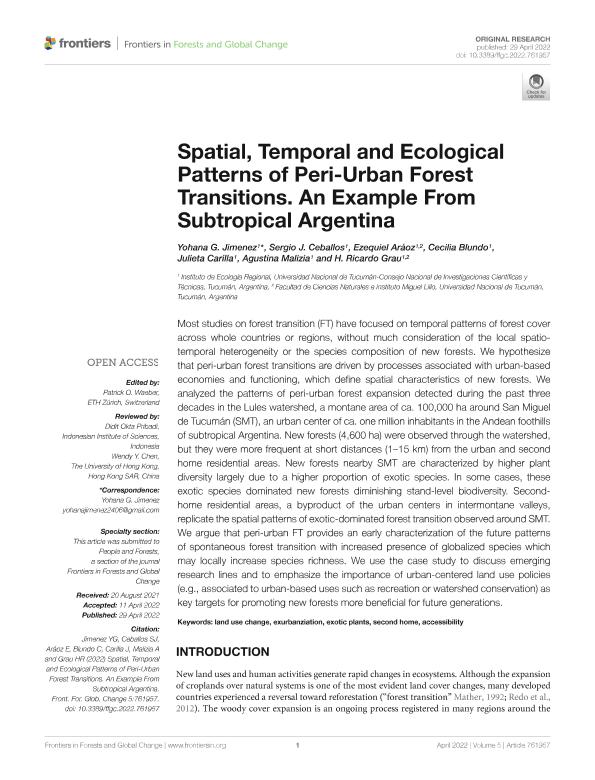Artículo
Spatial, Temporal and Ecological Patterns of Peri-Urban Forest Transitions: An Example From Subtropical Argentina
Jiménez, Yohana Gisell ; Ceballos, Sergio Javier
; Ceballos, Sergio Javier ; Aráoz, Ezequiel
; Aráoz, Ezequiel ; Blundo, Cecilia Mabel
; Blundo, Cecilia Mabel ; Carilla, Julieta
; Carilla, Julieta ; Malizia, Agustina
; Malizia, Agustina ; Grau, Hector Ricardo
; Grau, Hector Ricardo
 ; Ceballos, Sergio Javier
; Ceballos, Sergio Javier ; Aráoz, Ezequiel
; Aráoz, Ezequiel ; Blundo, Cecilia Mabel
; Blundo, Cecilia Mabel ; Carilla, Julieta
; Carilla, Julieta ; Malizia, Agustina
; Malizia, Agustina ; Grau, Hector Ricardo
; Grau, Hector Ricardo
Fecha de publicación:
04/2022
Editorial:
Frontiers Media
Revista:
Frontiers in Forests and Global Change
ISSN:
2624-893X
Idioma:
Inglés
Tipo de recurso:
Artículo publicado
Clasificación temática:
Resumen
Most studies on forest transition (FT) have focused on temporal patterns of forest cover across whole countries or regions, without much consideration of the local spatio-temporal heterogeneity or the species composition of new forests. We hypothesize that peri-urban forest transitions are driven by processes associated with urban-based economies and functioning, which define spatial characteristics of new forests. We analyzed the patterns of peri-urban forest expansion detected during the past three decades in the Lules watershed, a montane area of ca. 100,000 ha around San Miguel de Tucumán (SMT), an urban center of ca. one million inhabitants in the Andean foothills of subtropical Argentina. New forests (4,600 ha) were observed through the watershed, but they were more frequent at short distances (1–15 km) from the urban and second home residential areas. New forests nearby SMT are characterized by higher plant diversity largely due to a higher proportion of exotic species. In some cases, these exotic species dominated new forests diminishing stand-level biodiversity. Second-home residential areas, a byproduct of the urban centers in intermontane valleys, replicate the spatial patterns of exotic-dominated forest transition observed around SMT. We argue that peri-urban FT provides an early characterization of the future patterns of spontaneous forest transition with increased presence of globalized species which may locally increase species richness. We use the case study to discuss emerging research lines and to emphasize the importance of urban-centered land use policies (e.g., associated to urban-based uses such as recreation or watershed conservation) as key targets for promoting new forests more beneficial for future generations.
Palabras clave:
ACCESSIBILITY
,
EXOTIC PLANTS
,
EXURBANZIATION
,
LAND USE CHANGE
,
SECOND HOME
Archivos asociados
Licencia
Identificadores
Colecciones
Articulos(IER)
Articulos de INSTITUTO DE ECOLOGIA REGIONAL
Articulos de INSTITUTO DE ECOLOGIA REGIONAL
Citación
Jiménez, Yohana Gisell; Ceballos, Sergio Javier; Aráoz, Ezequiel; Blundo, Cecilia Mabel; Carilla, Julieta; et al.; Spatial, Temporal and Ecological Patterns of Peri-Urban Forest Transitions: An Example From Subtropical Argentina; Frontiers Media; Frontiers in Forests and Global Change; 5; 4-2022; 1-11
Compartir
Altmétricas



